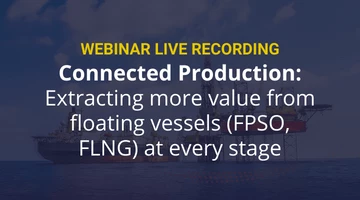FPSO - A Brazilian Success Story
Add bookmarkFloating production, storage and offloading (FPSO) is become increasingly more influential in the contemporary oil and gas industry, particularly to the world's developing economies.
The case for FPSO
FPSO units are particularly effective in remote and deepwater zones where it is neither practical nor cost-effective to lay seabed pipelines from a well to an onshore terminal.
They are also the ideal production unit for smaller oil fields as the vessel can simply move on to the next field when it is fully depleted. An FPSO is also an attractive way for E&P companies to downsize operations on a near-exhausted field where abandonment costs can be stratospheric.
FPSO in Brazil
The Santos Basin, located in the south Atlantic Ocean, some 300 kilometres south east of Sao Paulo, is one of the world's largest oil prospects.
Situated in deepwater, the Basin boast two of the largest oil fields to be discovered in recent times: Tupi (2006) and Jupiter (2008) as well as the potential Carioca/Sugar Loaf field which could contain as many as 40 billion barrels.
Given the fields' situation some 2,000 metres below the bottom of the Atlantic and lack of oil transportation infrastructure, Brazil has increasingly looked to FPSOs as a production solution.
Petrobras and the south Atlantic FPSO fleet
As of 2011, Brazilian multinational energy company, Petrobras, had more than 25 FPSOs in operation off the east coast of Brazil.
With the production on the Tupi and Jupiter fields ramping up and the potential of the Sugar Loaf field as yet unexploited, it is very likely that Brazil will become the largest FPSO market in the world, and the number of FPSOs on Brazilian fields will at least double in the coming decade.
FPSO and local content
Brazil has an aggressive local content stipulation of 75% and as such, in 2010, Petrobras selected the Rio Grande Shipyard and dry-dock, located in southern Brazil, as its first "home-grown" FPSO production centre.
According to Jon Harald Kilde, Rio-based General Manager of FPSO giant BW Offshore: "Brazil looks like it will become the largest FPSO market in the world and we want to participate."
"I think that the long term goal must be that Brazil wants to have a competitive industry. As it is today with too many privileges given through local content, will not help at all."
"There should be local content, but always looking to be competitive internationally and this combination is very difficult to make."
Carlos Mastrangelo, WR – Facilities Manager, Petrobras America is speaking at the 12th annual FPSO Congress on Day 2 1700. For more information please visit FPSO Asia
[eventpdf]











